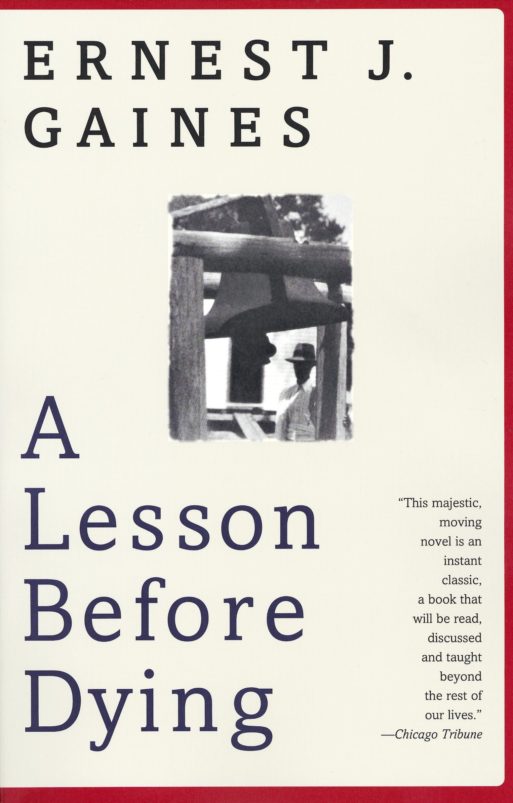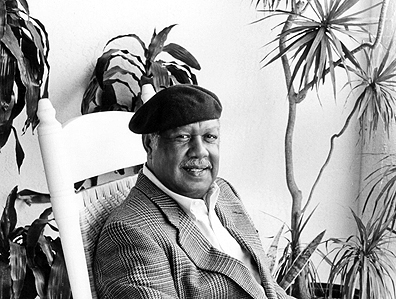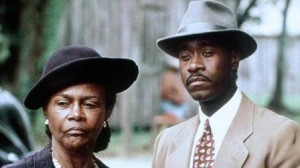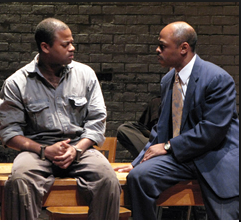 is the eighth novel of author and Louisiana native Ernest J. Gaines. Published in 1993, the story chronicles the intersecting lives of two Southern African American men in the 1940s. There is the character of Grant Wiggins, a well-intentioned but dissatisfied man who has returned home to teach at a local plantation school after university. Gaines juxtaposes the character of Grant with that of the un-educated Jefferson, a black man who risks internalizing the racist notion that he is not worthy or capable of an education.
is the eighth novel of author and Louisiana native Ernest J. Gaines. Published in 1993, the story chronicles the intersecting lives of two Southern African American men in the 1940s. There is the character of Grant Wiggins, a well-intentioned but dissatisfied man who has returned home to teach at a local plantation school after university. Gaines juxtaposes the character of Grant with that of the un-educated Jefferson, a black man who risks internalizing the racist notion that he is not worthy or capable of an education.
The story’s conflict begins when Jefferson finds himself in the wrong place at the wrong time. It’s a classically tried and tragically unjust story: African American man witnesses violent murder, is tried in front of an all-white jury and found guilty for a crime he did not commit. The resulting sentence? Death by electrocution.
As a black man with no political connections in mid-century America, Jefferson had but a sliver of a shot to walk free. Even his defense’s argument was an insult to his character. “Gentlemen of the jury,” states his lawyer, “this fool is not aware of right from wrong. Look at this—this boy. This skull here holds no plans. He’s [just] a thing to hold the handle of a plow. A hog.”
With months to pass in jail before his death, Jefferson’s godmother Emma asks Grant to give Jefferson some elementary education lessons before dying. In that way, she hopes he can walk to his death as “an educated man” instead of being perceived as a mere “hog in an electric chair.”
Grant is hesitant to agree. He is so jaded by the reality of injustice for his people that he doesn’t want to touch the situation with a ten-foot pole. Even though Grant is a very intelligent member of his community, he still has to “dumb himself down” with improper grammar to appease the “the white folks.” “What do you want me to do [for him]?” he asks Emma, “It’s only a matter of weeks, a couple of months, maybe. What can I do?”
Grant and Jefferson are at first bound only by a mutual frustration and hatred of oppression. But eventually a friendship is born through a sense of trust, confidence and openness. And Grant teaches Jefferson lessons much richer than any basic arithmetic. “Do you know what myth is, Jefferson?” he asks one day, “A myth is an old lie people believe in. White people believe they’re better than anyone else on earth—and that’s a myth. The last thing they want to see is a black man stand…I want you to chip away at that myth by standing.” He explains that Jefferson can be a real hero—that he can accomplish so much more than he, a more “privileged” and educated black man, ever could. “My eyes have been closed all my life,” Grant tells him, “[and] I need you. We all need you. Every last one of us.” But it all depends on how Jefferson chooses to react to his death sentence.
In many ways, Grant is the first person to expect more from Jefferson. Even though he has weeks to live, he refuses to tolerate Jefferson’s initially unsociable and self-pitying attitude. And by simply planting the seeds for confidence, by providing Jefferson with the basic tools for self-expression (a notebook and pencil), he instills in him a sense of self-worth.
The foil to Grant’s character is Reverend Ambrose, a man whose visits to the jail are aimed at bringing him into the Christian faith so “he may go to heaven…when the time comes” for him to die. Jefferson is understandably hesitant to embrace God as a positive presence in his life. “Y’all axe a lot,” he says when the Reverend explains he must be strong and “bear his cross” for Emma. “Who ever car’d my cross?” he asks, “My mama? My daddy? They dropped me when I wasn’t nothing. I went in the field when I was six.”
“Even though he has weeks to live, he refuses to tolerate Jefferson’s initially unsociable and self-pitying attitude.”
It is a powerful story, and it asserts the view that perhaps we need to cultivate a sense of faith in ourselves before we look to cultivate faith in another man’s religion; that sometimes we hold onto faith not for ourselves but for those we love. And through acknowledging the worth of our relationships with others and ourselves, our ability to have faith, religious or otherwise, becomes less tenuous.
But most importantly, A Lesson Before Dying reveals that we are never past the possibility for self-growth, and that this growth is just as crucial to foster at the end of our lives as it is at the beginning.
Other SevenPonds Book Reviews:
- Short Story: “Breaking the News,” by Vladmir Nabokov (1935)
- Book Review: “A Year to Live” by Stephen Levine
- Book Review: The Namesake, by Jhumpa Lahiri

 “A Lesson Before Dying” by Ernest J. Gaines
“A Lesson Before Dying” by Ernest J. Gaines





 “As Tears Go By” by Marianne Faithfull
“As Tears Go By” by Marianne Faithfull

 Funeral Favors Offer Visitors a Tangible Memento
Funeral Favors Offer Visitors a Tangible Memento















